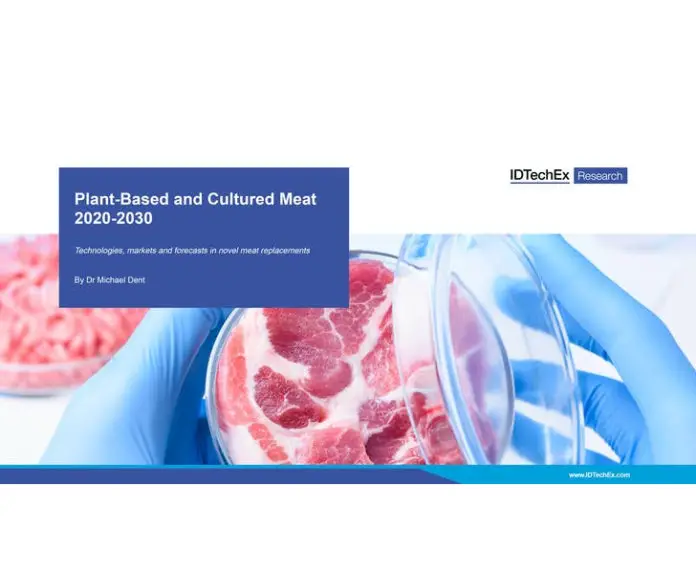Cultured meat, the idea that meat products can be artificially grown in a lab without requiring the slaughter of animals, has been attracting headlines. By growing muscle, fat, and connective tissue cells outside the animal, it is possible to produce meat-like products completely indistinguishable from the real thing, without the environmental and ethical issues associated with conventional meat production. The recent IDTechEx report, “Plant-based and cultured meat 2020-2030” explores the technologies and market factors involved in the rapidly emerging industries for meat alternatives.
Cultured meat has great potential to revolutionize global meat production and has generated a lot of hype in recent years. A 2019 AT Kearney report predicted that most of the meat people eat will not come from animals by 2040, with 35% of global meat intake coming from cultured meat. Investors around the world are reflecting this optimism – in the last five years the field has raised over $300 million in funding, with California start-up Memphis Meats raising $161 million earlier this year.
Despite the excitement around the industry, there is still one issue – no cultured meat company has yet released a product, and nobody is sure when the first products will come out. Some cultured meat companies having been bullish – JUST claimed in both 2018 and 2019 that their products would be released within the next year. Others, such as Memphis Meats and Mosa Meat have been more reserved, simply claiming that the products could appear in some form over the next few years.
The cultured meat industry has expanded rapidly over the last five years.
Source: IDTechEx Research – “Plant-based and cultured meat 2020-2030”
Although technology has advanced and funding has become more available, there are three big hurdles to cross before cultured meat can see its commercial release – price, scale, and regulation.
When Dr Mark Post, current CEO of Mosa Meat, unveiled the first cultured burger in 2013, it cost over $250,000 to produce. Things have come a long way since then, with JUST recently saying it could produce a cultured chicken nugget for about $50, but price remains a big issue. The dominant cost component for producing cultured meat is that of growth medium, the nutrient-rich serum that is fed to cells. Growth medium can cost almost $400 per liter and, with conventional bioreactors needing hundreds of litres to produce a single kg of cultured cells, this is a big problem.
However, according to cost calculations in the IDTechEx report, there is no fundamental reason why growth medium could not be far cheaper, it is just a matter of engineering and scale. The technology exists to produce cultured meat cheaply, it just has not been produced at a commercial scale before. Because this a completely new industry, there is not yet an ecosystem around cultured meat production, meaning many companies are having to do much of the development in-house, rather than being able to rely on partners for bioreactor development, growth medium production, etc. This means that getting everything ready for cultured meat up to a commercial scale takes a lot of time and money.
This leads to the next problem – regulatory approval. Before it can be sold commercially, cultured meat must secure regulatory approval, a process that takes around 2 years in the EU and is likely to take around 18 months in the US, once the process is finalized. No cultured meat company has yet submitted a bid for regulatory approval, however. This is mostly because no company has yet finalized its commercial-scale process, and so cannot say for sure what it will look like, preventing approval on aspects such as safety procedures.
Although this may all sound pessimistic, it is important to keep a sense of perspective. Cultured meat is an entirely new industry and it is natural that there will be challenges. Cultured meat has enormous potential to impact global food production, but the industry and its supporters will need to manage expectations in its formative years.
So, when will cultured meat arrive in stores? If everything goes right, it could see a commercial release in some form by around 2023, although it will still be several years before it is widespread across the world’s supermarkets.
More Information
For more information on this report, please visit www.IDTechEx.com/AltMeat or for the full portfolio of research available from IDTechEx please visit www.IDTechEx.com/Research.
IDTechEx guides your strategic business decisions through its Research, Consultancy and Event products, helping you profit from emerging technologies. For more information on IDTechEx Research and Consultancy, contact research@IDTechEx.com or visit www.IDTechEx.com.












